Sarah Allen's Blog, page 16
September 18, 2014
What's Another Word For Synonym?
One thing I've discovered about working in non-profit is that basically everyone you work with has a great sense of humor. They're all pretty wacky and fun. Since I'm up at the front desk and have several offices off to the side, I am not only the literal water cooler location, I get to see and hear what's going on in the offices around me a lot of times too.
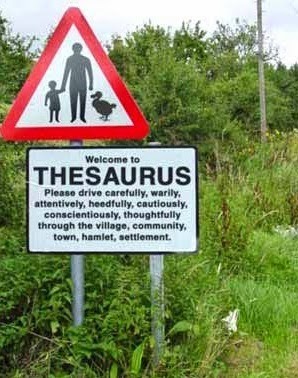
As the resident English major, I occasionally have coworkers ask me to do things like whip up text for a flier or check over their emails for grammar and punctuation before they send them off.
So the other day I was working at my front desk and one of my coworkers calls out from her office to my left:
Oh, and no need to look up synonyms for sexy, because you'll get this:
 Write on!
Write on!
Sarah Allen
For more updates, writing tips, and funnies, sign up for the monthly newsletter and get a free copy of 50 Marketing and Networking Tips for Writers!

As the resident English major, I occasionally have coworkers ask me to do things like whip up text for a flier or check over their emails for grammar and punctuation before they send them off.
So the other day I was working at my front desk and one of my coworkers calls out from her office to my left:
Her: Hey! Sarah! How do you spell leery?
Me: Like, wary? Or hesitant?
Her: Oh, yeah, that's better. I'll use hesitant.
*pause*
Her: You're like my personal, uh, synonym box!
Me: ...Thesaurus?Yeah, that may be the most perfect conversation I've ever had. (Well, second, but that's another story :)
Oh, and no need to look up synonyms for sexy, because you'll get this:
 Write on!
Write on!Sarah Allen
For more updates, writing tips, and funnies, sign up for the monthly newsletter and get a free copy of 50 Marketing and Networking Tips for Writers!
Published on September 18, 2014 05:00
September 15, 2014
Top 7 Mistakes That Make Your Writing Look Unprofessional
Writing is subjective enough.
So many important decisions that influence our careers depend on if an assistant got the right coffee that morning, or the timing of editors moving from one house to another, or a magazine editors daughter laughing at your story, or a myriad of other subjective things all out of our control. In many ways we writers are constantly subject to the whims of peoples moods and tastes. An editor or agent looking for say, historical romance, still needs to like our historical romance.
So what can we poor writers do when so much is out of our control? I think one aspect of dealing with that is acknowledging that in many ways this is an endurance game, and that those who stick with it will succeed in the end. However, the other aspect of all this is focusing on the elements we can control.
That means our writing.

When we submit to an agent or editor or anyone for that matter, we may not be able to control what kind of day they're having, or whether they prefer werewolves to vampires, but we can make our submission as clean as possible. We can stand out from many other submissions by sending prose that is polished to a shine and absolutely professional.
And we do that by avoiding several key mistakes that will make our writing look amateurish. Keeping these errors out of our writing can help us convince those agents and editors that we are serious writers, regardless what side of the bed they woke up on that morning.
1. Getting creative with the dialog tags. I'm pretty sure this isn't new to anybody, but it's definitely one of the biggest red flags. I know that as a reader I get a little eye-rolly when people are "bellowing loudly" and "exclaiming vehemently" and "vowing solemnly." Stick with said. Maybe sprinkled with the occasional asked. And if you really, really want to mix it up, maybe use a whisper. But the basic rule of thumb: just plain said.
2. Using exclamation points. In regular prose, the basic rule of thumb is "No Exclamation Points." Just no. Occasionally...strong emphasis on occasionally...they can be useful within dialog. Outside of that, they tend to read as a bit comic kampy. Bang! Womp! Pow! If you're feeling the need to use exclamation points for emphasis, there's a good chance that's a symptom of week prose that might not be bearing the emphasis on its own. Don't get me started on interrobangs...
3. Overuse of adverbs. Before you roll your eyes at yet another someone telling you to avoid adverbs at all costs, just hear me out. I'm not one of those who think of adverbs as pure poison, the smallest dose of which can kill a pet project in its infancy. No, I think every word has its use. Including adverbs. The issue is when you get attached. People often say to avoid too many adverbs because they are too strong, but I think it's just the opposite. Some writers tend to rely on adverbs to show the scene, when really they are some of the weakest descriptors of all, unless used carefully. It's like with exclamation points--mixing it up can lead to stronger writing.
5. Sentence length never varies. Words and sentences have rhythm. Like singing a line of song. Readers get into a set pace. That pace gets old very fast. But if you're conscious of that rhythm, you can take advantage by changing it up. Write short sentences. Then write sentences that wander, that meander, that add to your prose a little bit of syncopation. The change in pace will move your reader forward and keep them interested. That's how you look professional.
6. Switching point-of-view. Otherwise known as head hopping. This can make things very confusing for your reader, and make your writing appear unprofessional. This is when you're in a scene with your point of view character, let's call her Betty, and your secondary character, Martha. If we're in this scene and suddenly we get:
7. Using cliche phrases. There's not much to say about this one. And no quicker way, really, to know all the phrases to avoid than just by doing lots and lots of reading. A good rule of thumb is to avoid any phrase you remember hearing before. Saying a character is "cold as ice" doesn't really say anything anymore. Saying a characters eyes are "blue like the ocean" will generally just make your reader roll theirs. Then suddenly all hell will break loose.
I hope these tips help, but first a reminder: writing rules are, to quote the inimitable Captain Barbosa, more actual guidelines. It is important to know the "rules," and follow them probably the vast majority of the time. That is how you make your writing professional. But to make your writing personal--to make it memorable to your readers--add your own style and flavor. Be you. And if that means tweaking a few of these rules every once in a while, then try it out. See if it works.
Write on!
Sarah Allen
This Week on Social Media:
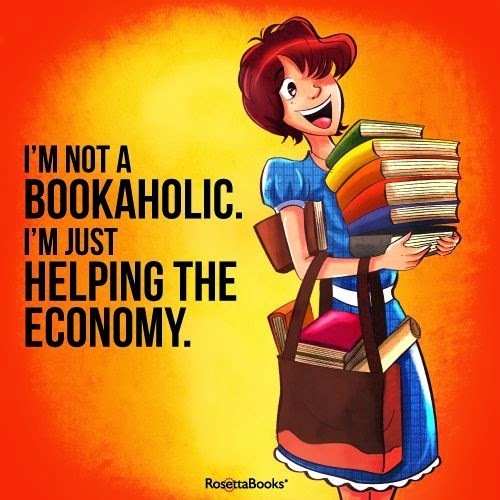
For more frequent updates, writing tips, and funnies, follow on Facebook, Twitter, Google+,
YouTube, Pinterest, Tumblr, GoodReads, and/or Instagram.
SUBMISSION OPPORTUNITIES:
Madcap Review: Madcap Review, a semiannual online journal of art and literature, will be accepting submissions for its second issue from September 1st to October 31st.Allegro Poetry Magazine: Allegro Poetry Magazine seeks to publish the best contemporary poetry. Issue 1 will be published at the beginning of October and the editor is looking for poems on the theme “New”. Due Oct. 31.The Great American Lit Mag: Online literary magazine Inaugural Issue! The Great American Lit Mag is looking for fearless and inventive fiction and poetry. We publish quarterly. Due Sep. 30.Howl Magazine: Howl, edited by Deltona High School students, is currently seeking submissions of poetry, fiction, nonfiction, and art for our brand new online literary magazine. Please feel free to send up to five poems or art and no more than one piece of prose at a time. Year-round.Lunch Ticket Magazine: Literary magazine Lunch Ticket (Antioch University) is accepting submissions for its Winter/Spring 2015 issue. Submissions welcome in the following genres: fiction, nonfiction, poetry, writing for young people, visual art, and translation. Due Oct. 31.
SPOTLIGHTS:
Working for Free: When it Makes Sense (The Write Life) 5 Tips How to Write and Sell a Picture Book (The Plot Whisperer)How Can You Stand Out on Social Media (Social Media Today) The Secret to Publishing Success in the Era of Social Media (Anne R. Allen) 34 Blogging Topics Just for Writers (Social Media Just for Writers)
So many important decisions that influence our careers depend on if an assistant got the right coffee that morning, or the timing of editors moving from one house to another, or a magazine editors daughter laughing at your story, or a myriad of other subjective things all out of our control. In many ways we writers are constantly subject to the whims of peoples moods and tastes. An editor or agent looking for say, historical romance, still needs to like our historical romance.
So what can we poor writers do when so much is out of our control? I think one aspect of dealing with that is acknowledging that in many ways this is an endurance game, and that those who stick with it will succeed in the end. However, the other aspect of all this is focusing on the elements we can control.
That means our writing.

When we submit to an agent or editor or anyone for that matter, we may not be able to control what kind of day they're having, or whether they prefer werewolves to vampires, but we can make our submission as clean as possible. We can stand out from many other submissions by sending prose that is polished to a shine and absolutely professional.
And we do that by avoiding several key mistakes that will make our writing look amateurish. Keeping these errors out of our writing can help us convince those agents and editors that we are serious writers, regardless what side of the bed they woke up on that morning.
1. Getting creative with the dialog tags. I'm pretty sure this isn't new to anybody, but it's definitely one of the biggest red flags. I know that as a reader I get a little eye-rolly when people are "bellowing loudly" and "exclaiming vehemently" and "vowing solemnly." Stick with said. Maybe sprinkled with the occasional asked. And if you really, really want to mix it up, maybe use a whisper. But the basic rule of thumb: just plain said.
2. Using exclamation points. In regular prose, the basic rule of thumb is "No Exclamation Points." Just no. Occasionally...strong emphasis on occasionally...they can be useful within dialog. Outside of that, they tend to read as a bit comic kampy. Bang! Womp! Pow! If you're feeling the need to use exclamation points for emphasis, there's a good chance that's a symptom of week prose that might not be bearing the emphasis on its own. Don't get me started on interrobangs...
3. Overuse of adverbs. Before you roll your eyes at yet another someone telling you to avoid adverbs at all costs, just hear me out. I'm not one of those who think of adverbs as pure poison, the smallest dose of which can kill a pet project in its infancy. No, I think every word has its use. Including adverbs. The issue is when you get attached. People often say to avoid too many adverbs because they are too strong, but I think it's just the opposite. Some writers tend to rely on adverbs to show the scene, when really they are some of the weakest descriptors of all, unless used carefully. It's like with exclamation points--mixing it up can lead to stronger writing.
5. Sentence length never varies. Words and sentences have rhythm. Like singing a line of song. Readers get into a set pace. That pace gets old very fast. But if you're conscious of that rhythm, you can take advantage by changing it up. Write short sentences. Then write sentences that wander, that meander, that add to your prose a little bit of syncopation. The change in pace will move your reader forward and keep them interested. That's how you look professional.
6. Switching point-of-view. Otherwise known as head hopping. This can make things very confusing for your reader, and make your writing appear unprofessional. This is when you're in a scene with your point of view character, let's call her Betty, and your secondary character, Martha. If we're in this scene and suddenly we get:
"These croissants are delicious," Martha lied. She knew Betty couldn't cook to save her life.than suddenly we're in Martha's head, seeing what she thinks. We've hopped from Betty's head to Martha's. Switched point-of-view. An automatic red-flag of unprofessionalism.
7. Using cliche phrases. There's not much to say about this one. And no quicker way, really, to know all the phrases to avoid than just by doing lots and lots of reading. A good rule of thumb is to avoid any phrase you remember hearing before. Saying a character is "cold as ice" doesn't really say anything anymore. Saying a characters eyes are "blue like the ocean" will generally just make your reader roll theirs. Then suddenly all hell will break loose.
I hope these tips help, but first a reminder: writing rules are, to quote the inimitable Captain Barbosa, more actual guidelines. It is important to know the "rules," and follow them probably the vast majority of the time. That is how you make your writing professional. But to make your writing personal--to make it memorable to your readers--add your own style and flavor. Be you. And if that means tweaking a few of these rules every once in a while, then try it out. See if it works.
Write on!
Sarah Allen
This Week on Social Media:

For more frequent updates, writing tips, and funnies, follow on Facebook, Twitter, Google+,
YouTube, Pinterest, Tumblr, GoodReads, and/or Instagram.
SUBMISSION OPPORTUNITIES:
Madcap Review: Madcap Review, a semiannual online journal of art and literature, will be accepting submissions for its second issue from September 1st to October 31st.Allegro Poetry Magazine: Allegro Poetry Magazine seeks to publish the best contemporary poetry. Issue 1 will be published at the beginning of October and the editor is looking for poems on the theme “New”. Due Oct. 31.The Great American Lit Mag: Online literary magazine Inaugural Issue! The Great American Lit Mag is looking for fearless and inventive fiction and poetry. We publish quarterly. Due Sep. 30.Howl Magazine: Howl, edited by Deltona High School students, is currently seeking submissions of poetry, fiction, nonfiction, and art for our brand new online literary magazine. Please feel free to send up to five poems or art and no more than one piece of prose at a time. Year-round.Lunch Ticket Magazine: Literary magazine Lunch Ticket (Antioch University) is accepting submissions for its Winter/Spring 2015 issue. Submissions welcome in the following genres: fiction, nonfiction, poetry, writing for young people, visual art, and translation. Due Oct. 31.
SPOTLIGHTS:
Working for Free: When it Makes Sense (The Write Life) 5 Tips How to Write and Sell a Picture Book (The Plot Whisperer)How Can You Stand Out on Social Media (Social Media Today) The Secret to Publishing Success in the Era of Social Media (Anne R. Allen) 34 Blogging Topics Just for Writers (Social Media Just for Writers)
Published on September 15, 2014 05:00
September 11, 2014
The Hidden Skeletons in Disneyland's Closet; or I See Dead Pirates
My family has been to Disneyland enough times that it has become somewhat of a multi-day Easter egg hunt. We own the book about all the "Hidden Mickeys." We've found the hidden Eeyore in the Indiana Jones ride. (He's in the room with the projector where Sallah is telling you all about the eyes of the idol and how to wear seat-belts. Look up behind the projector--a Cast Member can show you). We've learned that a pineapple float from the Dole Whip stand by the Tikki Room is maybe the best food ever made, and that the Haunted Mansion doesn't actually give out Death Certificates. (We tried. Several times.)
We learned something new this last trip. Something that is perhaps my favorite Disneyland tidbit yet.
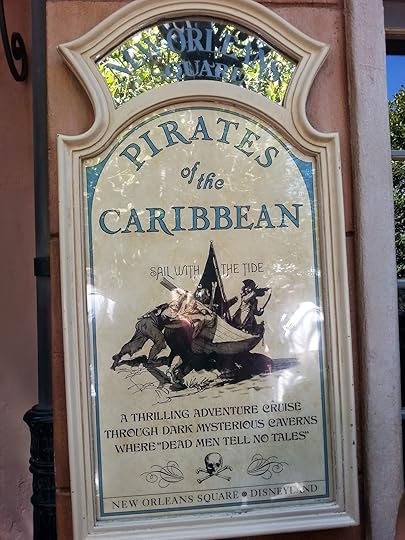
In typical Walt "Make It Perfect" Disney fashion, when the Pirates of the Caribbean ride was originally constructed, they used actual skeletons. Actual. Skeletons. Of course in subsequent remodeling these actual dead pirates bodies were replaced with fake ones.
Except not all of them.
There is a remaining actual pirate skull. It's the one in the headboard in the captains quarters. And maybe it's just me but I think you can tell.

I know this probably says a little too much about my morbid side, but I think that's pretty awesome. And it's unfortunate that "Remains of a Loved One" is among the top items on the list of things not allowed in Disney parks, which makes me wonder how many people tried to spread the ashes of their loved one in the Rivers of America before Disney decided they had to make it against the rules, but I also have to acknowledge that the sentiment makes sense to me because if I was going to pick one place to be laid to rest it would be in the creepy banjo players cabin across from the Blue Bayou restaurant. (Can you imagine any better place to haunt? Sliding into the back of the boat of unsuspecting visitors, clamping your bony fingers over their terrified shoulders at just the right moment...*sigh* good times).
But again, against the rules. But I imagine that Disneyland would be one of those strict but very kind parents. Like, say, hypothetically, if your brother in law accidentally brought a big old Swiss army knife in his backpack and then lost the backpack and had to go check at the lost and found and then had to choose whether to leave and take the knife home or let the Cast Member dispose of it, he would be escorted by security all the way off Disney property so he could take the knife back to the hotel and then given fast passes for everyone in the group. All hypothetical of course.
But it could mean, hypothetically, that there's a box somewhere with a bunch of confiscated knives and stink bombs and hand-cuffs and zip-ties (all things on the Not Allowed In the Parks list).
Because even this place's hidden skeletons are totally awesome.
Write on!
Sarah Allen
P.S. So this is a new thing we're going to try every Thursday. This will be our weekly Story-time, where we chat about interesting things, look at cool pictures, and mostly just tell funny stories. The Monday writing advice posts will remain exactly the same, and then we'll go a little more casual with these story-time posts every Thursday. Hopefully these provide fun reads as you gear up for the weekend :)
For more updates, writing tips, and funnies, sign up for the monthly newsletter and get a free copy of 50 Marketing and Networking Tips for Writers!
We learned something new this last trip. Something that is perhaps my favorite Disneyland tidbit yet.

In typical Walt "Make It Perfect" Disney fashion, when the Pirates of the Caribbean ride was originally constructed, they used actual skeletons. Actual. Skeletons. Of course in subsequent remodeling these actual dead pirates bodies were replaced with fake ones.
Except not all of them.
There is a remaining actual pirate skull. It's the one in the headboard in the captains quarters. And maybe it's just me but I think you can tell.

I know this probably says a little too much about my morbid side, but I think that's pretty awesome. And it's unfortunate that "Remains of a Loved One" is among the top items on the list of things not allowed in Disney parks, which makes me wonder how many people tried to spread the ashes of their loved one in the Rivers of America before Disney decided they had to make it against the rules, but I also have to acknowledge that the sentiment makes sense to me because if I was going to pick one place to be laid to rest it would be in the creepy banjo players cabin across from the Blue Bayou restaurant. (Can you imagine any better place to haunt? Sliding into the back of the boat of unsuspecting visitors, clamping your bony fingers over their terrified shoulders at just the right moment...*sigh* good times).
But again, against the rules. But I imagine that Disneyland would be one of those strict but very kind parents. Like, say, hypothetically, if your brother in law accidentally brought a big old Swiss army knife in his backpack and then lost the backpack and had to go check at the lost and found and then had to choose whether to leave and take the knife home or let the Cast Member dispose of it, he would be escorted by security all the way off Disney property so he could take the knife back to the hotel and then given fast passes for everyone in the group. All hypothetical of course.
But it could mean, hypothetically, that there's a box somewhere with a bunch of confiscated knives and stink bombs and hand-cuffs and zip-ties (all things on the Not Allowed In the Parks list).
Because even this place's hidden skeletons are totally awesome.

Write on!
Sarah Allen
P.S. So this is a new thing we're going to try every Thursday. This will be our weekly Story-time, where we chat about interesting things, look at cool pictures, and mostly just tell funny stories. The Monday writing advice posts will remain exactly the same, and then we'll go a little more casual with these story-time posts every Thursday. Hopefully these provide fun reads as you gear up for the weekend :)
For more updates, writing tips, and funnies, sign up for the monthly newsletter and get a free copy of 50 Marketing and Networking Tips for Writers!
Published on September 11, 2014 05:00
September 8, 2014
How To Write In A New Genre (And 4 Reasons You Should)
One of my favorite things to do is venue research--finding places where I might place some words. In fact I have to be careful that browsing magazine listings doesn't take time away from actual writing. But I love to browse the calls for submission at NewPages or look at the awesome list of consumer magazines at Funds For Writers. Often writers will have a page on their website or blog that lists their publication credits, sometimes years and years back, and you can see all the magazines they've contributed to. Another great list of potential places to submit. One of my favorites, particularly for speculative fiction writers, is the website of Mary Robinette Kowal.
One thing this habit has done, besides necessitate more conscious and increased focus on my main projects, is encourage me to expand my literary horizons.
 I've always been more of a contemporary writer. The short story I wrote in my eighth grade creative writing class was about a single mom seeing her son in her dead husbands cigarette scented leather jacket. (Not presumptuous at all, right?). I adored Chronicles of Narnia and Chronicles of Prydain, but most of my childhood reading was stuff like Walk Two Moons and The Great Brain and Cricket in Times Square.
I've always been more of a contemporary writer. The short story I wrote in my eighth grade creative writing class was about a single mom seeing her son in her dead husbands cigarette scented leather jacket. (Not presumptuous at all, right?). I adored Chronicles of Narnia and Chronicles of Prydain, but most of my childhood reading was stuff like Walk Two Moons and The Great Brain and Cricket in Times Square.
My point is this: though my reading habits have grown and shifted, and though almost all my recent work is sort of a blend of contemporary and fantasy, I've never really written a hard sci-fi or high fantasy piece.
Some of the best opportunities and venues I've come across in my research are for hard sci-fi and high fantasy.
Which means I'm needing to stretch myself, if I want to participate in these opportunities. In fact, I'm working on a piece now that I hope to submit for consideration in a sci-fi anthology. It is definitely a challenge, but I feel like I am learning a lot, and seeing some great potential benefits.
So if you want to write in a genre you've never tried before, how do you do it? And why should you even try?
One of the most important tools for writing in a new genre is reading in that new genre. That is the best way to get the flavor and tone of the tradition you are joining. There are a lot of things about writing that one learns best through a sort of osmosis, and reading in a new genre can help you avoid cliches and pitfalls that might be specific to the genre you're trying out.
Try reading blogs from authors in the new genre. This, along with the reading, can be a sort of genre crash course. Author bloggers often talk about the ins and outs of their genre, and reading these posts can help you get some of the "insider" scoop. For example, if you want to try romance, reading the blogs of some established romance writers might help you figure out genre pillars romance readers expect, as well as cliches to avoid to help you stand out in a positive way.
Most of all, be you and have fun. In some ways, I feel like these strict genre delineations are a bit silly and can be the opposite of useful. I think what many of us write already has a little bit of this and a little bit of that. (This is why when query time comes around, it can be tempting to make the "It's a rom-com meets horror but also with cowboys and a dash of the paranormal" mistake.) The point is, we are all extremely unique, and its important to bring to the table what only you can bring to the table. Learn the genre, know the genre, then do it how only you do. Just go for it.
Okay though. This does kind of seem like a lot of work, right? And maybe a little intimidating. Definitely has been that way in my experience. So why do it? Why not just stick with our comfort zone?
1. Your overall writing will improve, including in your normal genre. Imagine someone at the gym who is really working on building those biceps. They work those biceps hard, and know all the best methods and tricks. The thing is, if they do nothing but work the biceps, they run the risk of stagnation. To help them progress, they should remember that it's all connected, and that their quest for perfect biceps can in fact be assisted by working other muscles like the triceps and deltoids.
Such is the case with genre, in my opinion. I have learned things in experimenting in new genres that I can most definitely take back and incorporate into the stuff I typically write. Here's a graphic that shows what I mean, and I think is a great place to start.
2. You will make new industry connections. Plain and simple. By, for example, submitting to genre magazines you wouldn't otherwise have submitted to, you will make those connections you might have missed out on. And those connections can lead to additional great opportunities, both in and outside of your regular genre.
3. You will broaden your writing resume. Writing in a multitude of genres gives us versatility and flexibility. We grow our street cred. Then when more opportunities come up that we want to pursue, we have the experience and even some word count to back it up. I may be in the beginnings of my hard SF journey now, but next time I see a great opportunity in that genre, I'll have that much more experience in my tool belt. I think most of us rather enjoy working in lots of genres, like we enjoy reading in lots of genres, so starting now and building up that broad resume can really get us off to a good start.
4. You will find new readers. Again, I think most of us typically read in a lot of genres. I mean, we may have a genre we gravitate to more often than others, but I think most of us mix it up every once in a while. And so do our readers. A reader who typically reads hard SF might very well also enjoy contemporary YA. In other words, even if a prospective reader discovers me through a science fiction magazine, that may help me grow my readership in the other genres. Same with anyone. If you typically write historical novels but then decide to submit a short story to Ellery Queen's Mystery Magazine, the overlap could very well help you find more readers for your historical novels.
Do you think its worth it to try writing in a new genre? What is your typical genre, and what others might you want to try?
Write on!
Sarah Allen
This Week on Social Media:

For more frequent updates, writing tips, and funnies, follow on Facebook, Twitter, Google+,
YouTube, Pinterest, Tumblr, GoodReads, and/or Instagram.
SUBMISSION OPPORTUNITIES:
Tennessee Williams Literary Festival Short Fiction Contest: Submit a short story, up to 7000 words. Grand Prize: $1,500, plus airfare for the next Festival in New Orleans, VIP All-Access Festival pass for the next Festival ($500 value), plus publication in Louisiana Cultural Vistas magazine. $25 entrance fee. Due Nov. 16.Beecher's Magazine: Beecher’s Magazine, an annual print journal produced by graduate students at the University of Kansas, seeks inimitable poetry, fiction, nonfiction, and art for its fifth anniversary issue. Due Feb. 14.Pentimento: Pentimento, a literary magazine for the disability community, is accepting submissions for our Winter 2014/2015 issue. We publish disability-related essays, poetry, and fiction and artwork and photography by individuals with a disability. The writing topic for the Winter issue is “Romance,” and we’re seeking true stories regarding romance and disability. Due Sep. 30The Last Line: From the fine folks who bring you The First Line: We're going to try a little experiment. We've got a last line for you, and we want you to give us the story that ends there. We'll follow the same guidelines as The First Line (300-5,000 words), with the twist that all of your stories must end with the last line provided. Due Oct. 1Building Red Anthology: Walrus Publishing, an independent press from St. Louis, Missouri, is now accepting submissions for our sci/fi anthology, Building Red-The Colonization of Mars. Due Nov. 1.
SPOTLIGHTS: Mommy Transforms her Toddler's Sketches into Beautiful Paintings (Visual News) Recruiting Extras [writing crowd scenes] (Patricia C. Wrede) How Much Should You Charge For Your Ebook? (Make a Living Writing) 5 Tips for Long-Term Writing Success (Kristen Lamb) Top 30 Websites for Indie Authors (Author Marketing Experts, Inc.)
One thing this habit has done, besides necessitate more conscious and increased focus on my main projects, is encourage me to expand my literary horizons.
 I've always been more of a contemporary writer. The short story I wrote in my eighth grade creative writing class was about a single mom seeing her son in her dead husbands cigarette scented leather jacket. (Not presumptuous at all, right?). I adored Chronicles of Narnia and Chronicles of Prydain, but most of my childhood reading was stuff like Walk Two Moons and The Great Brain and Cricket in Times Square.
I've always been more of a contemporary writer. The short story I wrote in my eighth grade creative writing class was about a single mom seeing her son in her dead husbands cigarette scented leather jacket. (Not presumptuous at all, right?). I adored Chronicles of Narnia and Chronicles of Prydain, but most of my childhood reading was stuff like Walk Two Moons and The Great Brain and Cricket in Times Square.My point is this: though my reading habits have grown and shifted, and though almost all my recent work is sort of a blend of contemporary and fantasy, I've never really written a hard sci-fi or high fantasy piece.
Some of the best opportunities and venues I've come across in my research are for hard sci-fi and high fantasy.
Which means I'm needing to stretch myself, if I want to participate in these opportunities. In fact, I'm working on a piece now that I hope to submit for consideration in a sci-fi anthology. It is definitely a challenge, but I feel like I am learning a lot, and seeing some great potential benefits.
So if you want to write in a genre you've never tried before, how do you do it? And why should you even try?
One of the most important tools for writing in a new genre is reading in that new genre. That is the best way to get the flavor and tone of the tradition you are joining. There are a lot of things about writing that one learns best through a sort of osmosis, and reading in a new genre can help you avoid cliches and pitfalls that might be specific to the genre you're trying out.
Try reading blogs from authors in the new genre. This, along with the reading, can be a sort of genre crash course. Author bloggers often talk about the ins and outs of their genre, and reading these posts can help you get some of the "insider" scoop. For example, if you want to try romance, reading the blogs of some established romance writers might help you figure out genre pillars romance readers expect, as well as cliches to avoid to help you stand out in a positive way.
Most of all, be you and have fun. In some ways, I feel like these strict genre delineations are a bit silly and can be the opposite of useful. I think what many of us write already has a little bit of this and a little bit of that. (This is why when query time comes around, it can be tempting to make the "It's a rom-com meets horror but also with cowboys and a dash of the paranormal" mistake.) The point is, we are all extremely unique, and its important to bring to the table what only you can bring to the table. Learn the genre, know the genre, then do it how only you do. Just go for it.
Okay though. This does kind of seem like a lot of work, right? And maybe a little intimidating. Definitely has been that way in my experience. So why do it? Why not just stick with our comfort zone?
1. Your overall writing will improve, including in your normal genre. Imagine someone at the gym who is really working on building those biceps. They work those biceps hard, and know all the best methods and tricks. The thing is, if they do nothing but work the biceps, they run the risk of stagnation. To help them progress, they should remember that it's all connected, and that their quest for perfect biceps can in fact be assisted by working other muscles like the triceps and deltoids.
Such is the case with genre, in my opinion. I have learned things in experimenting in new genres that I can most definitely take back and incorporate into the stuff I typically write. Here's a graphic that shows what I mean, and I think is a great place to start.
2. You will make new industry connections. Plain and simple. By, for example, submitting to genre magazines you wouldn't otherwise have submitted to, you will make those connections you might have missed out on. And those connections can lead to additional great opportunities, both in and outside of your regular genre.
3. You will broaden your writing resume. Writing in a multitude of genres gives us versatility and flexibility. We grow our street cred. Then when more opportunities come up that we want to pursue, we have the experience and even some word count to back it up. I may be in the beginnings of my hard SF journey now, but next time I see a great opportunity in that genre, I'll have that much more experience in my tool belt. I think most of us rather enjoy working in lots of genres, like we enjoy reading in lots of genres, so starting now and building up that broad resume can really get us off to a good start.
4. You will find new readers. Again, I think most of us typically read in a lot of genres. I mean, we may have a genre we gravitate to more often than others, but I think most of us mix it up every once in a while. And so do our readers. A reader who typically reads hard SF might very well also enjoy contemporary YA. In other words, even if a prospective reader discovers me through a science fiction magazine, that may help me grow my readership in the other genres. Same with anyone. If you typically write historical novels but then decide to submit a short story to Ellery Queen's Mystery Magazine, the overlap could very well help you find more readers for your historical novels.
Do you think its worth it to try writing in a new genre? What is your typical genre, and what others might you want to try?
Write on!
Sarah Allen
This Week on Social Media:

For more frequent updates, writing tips, and funnies, follow on Facebook, Twitter, Google+,
YouTube, Pinterest, Tumblr, GoodReads, and/or Instagram.
SUBMISSION OPPORTUNITIES:
Tennessee Williams Literary Festival Short Fiction Contest: Submit a short story, up to 7000 words. Grand Prize: $1,500, plus airfare for the next Festival in New Orleans, VIP All-Access Festival pass for the next Festival ($500 value), plus publication in Louisiana Cultural Vistas magazine. $25 entrance fee. Due Nov. 16.Beecher's Magazine: Beecher’s Magazine, an annual print journal produced by graduate students at the University of Kansas, seeks inimitable poetry, fiction, nonfiction, and art for its fifth anniversary issue. Due Feb. 14.Pentimento: Pentimento, a literary magazine for the disability community, is accepting submissions for our Winter 2014/2015 issue. We publish disability-related essays, poetry, and fiction and artwork and photography by individuals with a disability. The writing topic for the Winter issue is “Romance,” and we’re seeking true stories regarding romance and disability. Due Sep. 30The Last Line: From the fine folks who bring you The First Line: We're going to try a little experiment. We've got a last line for you, and we want you to give us the story that ends there. We'll follow the same guidelines as The First Line (300-5,000 words), with the twist that all of your stories must end with the last line provided. Due Oct. 1Building Red Anthology: Walrus Publishing, an independent press from St. Louis, Missouri, is now accepting submissions for our sci/fi anthology, Building Red-The Colonization of Mars. Due Nov. 1.
SPOTLIGHTS: Mommy Transforms her Toddler's Sketches into Beautiful Paintings (Visual News) Recruiting Extras [writing crowd scenes] (Patricia C. Wrede) How Much Should You Charge For Your Ebook? (Make a Living Writing) 5 Tips for Long-Term Writing Success (Kristen Lamb) Top 30 Websites for Indie Authors (Author Marketing Experts, Inc.)
Published on September 08, 2014 05:00
September 1, 2014
How To Use Your Hobbies To Build Your Author Platform
 An "author platform" is at once an urgent and ambiguous term. We hear all the time about how important it is, and how building a marketing and publicity platform is second only in importance to the writing itself. We must write the most and the best that we can, but then we must find people to read that writing.
An "author platform" is at once an urgent and ambiguous term. We hear all the time about how important it is, and how building a marketing and publicity platform is second only in importance to the writing itself. We must write the most and the best that we can, but then we must find people to read that writing.This raises two questions. First, how do we most successfully build that author platform, and second, how do we do it most efficiently, taking as little time as possible from the writing. One of the best answers I've come up with is to use aspects of our lives already in place. Kill two birds with one stone.
Use our hobbies.
I believe using our hobbies can both provide a way for us to build our author platforms, and a way for us to do it efficiently.
Here's a few ways I think we can do that.
1. Source for social media content: With smart phones, high quality pictures of basically anything are immediately shareable. And visual content is the king of modern social media. We writers typically think of posting stuff about writing on social media, but occasionally getting fun or quirky or personal can work wonders. And we want more than just our fellow writers in our audience, right? (Though our fellow writers are also incredibly important and valuable members of that audience.) So while you're out in your garden, or fixing a car, or painting, or playing guitar or chasing tornadoes or whatever it is you do, take a picture and share it. You might bring a smile to some faces.
2. Source for article ideas: Part of building a writer platform is being varied in our writing projects and gigs. Most of us write novels, but to build a platform we can add short stories, poetry, essays, scripts, and, of course, magazine articles. So if you do hair or make birthday cards or garden, that is the perfect place to start for magazine article topics. There are quite literally magazines on any topic. And here is a great place to start.
3. How-to tutorials: Tutorials are some of the most clickable and shareable content on the web, and if you have a special area of expertise, take advantage of it! Even if you have a writing blog, I don't think its bad to add a little variety to it once in a while. You can make a tutorial about planting tomatoes or sketching a dragon or making a frame out of an old book cover. I think these kind of posts will bring new readers to your audience. And don't forget to post a link on Pinterest. How-to's do particularly well over there.
4. Joining communities: Writers often reference author-specific communities, and those can be incredibly valuable. Other writers can be our mentors, guides, and biggest supporters. But if we're building a platform, and working to grow our audience, we would do best to expand to other groups as well. And this is where our hobbies can come in to play. Join an online gardening forum or gaming group. If you're interested in learning photography, maybe check out some community classes. Audition for a play at a local theater. These are all great opportunities to build your platform and grow your network. While talking with awesome people and making friends :)
5. Point of collaboration: So far we've mostly been talking about ways to incorporate our own hobbies into our platform building. But I think we can also build our author platforms by partnering up with others and utilizing their hobbies. For example, if you're not a photographer but have a friend who is, you could invite them to guest post on your blog about how to take great cover photos. Or perhaps you've always wanted to try your hand at writing songs, but aren't a musician. Maybe collaborate with a friend who plays the guitar, and another friend who likes to make music videos. I think in terms of building platform, two heads are definitely better than one.
What do you think? Are there other ways we can use our hobbies to help build our author platform?
Write on!
This week on social media:

For more frequent updates, writing tips, and funnies, follow on Facebook, Twitter, Google+,
YouTube, Pinterest, Tumblr, GoodReads, and/or Instagram.
SUBMISSION OPPORTUNITIES:Death Where the Nights Are Long: Death Where the Nights are Long is an anthology of writing about the idea and experience of death in extreme lattitudes. Due Nov. 1Chicken Soup for the Soul-Thanks to my Mom: We are collecting stories of thanks written by sons and daughters of all ages about their moms and stepmoms. Tell us what your mom has done for you and why you are grateful to her. Due Sep. 30Brickplight: Brickplight exists to promote the exploration of unique identities through daring poetry. Due Oct. 25Glassworks Magazine: Glassworks Magazine, a journal of literature and art publishing digitally and in print, seeks poetry, fiction, nonfiction, craft essays, art/photography, and new media (video, audio, multi-modal, etc.) for upcoming issues. Due Dec. 15Little Patuxent Review: Little Patuxent Review is accepting submissions of poetry, fiction, creative nonfiction, and artwork for the Winter 2015 Food issue. How many tongues can you access through the language of food? How many minutes could you commune with a family at a foreign table, supported with the language of food? Due Nov. 1
SPOTLIGHT:How to Become A Lean Mean Writing Machine (Kristen Lamb's blog) How I Got Over My Author Complex And Became A "Real" Writer (Make A Living Writing)Blogging and Social Media Tips For Writers (Social Media Just For Writers) The Dozen New Digital Rules Authors Need to Know (Writer Unboxed)
Published on September 01, 2014 05:00
August 25, 2014
A Question for YOU
It's been a while since I've dedicated a post to getting feedback from you guys, and it's about time to do that again. I may ask some of the same questions, so I apologize to those of you who've been here long enough to answer some of these. But I would still very much love to hear your answer, even if its a repeat, and there are some new questions too.
This, for me, is one of the best ways I know to figure out how I can grow and improve as a writer on the internet. I want to know what you think, and what is most beneficial and interesting to you. Yes YOU. I would love to hear your answers to all or any of the following questions.
1. What blogs do you visit most? I basically want to know which blogs are your favorite (in addition to this one, of course ;) and I'm thinking that one of the best ways to gauge how helpful a blog is for you is to see how often you find yourself going back. So which blogs do you go back to again and again? Give me your top two or three, or more!
2. What book are you reading now, and how/where did you discover it?
3. How do you feel about the following on author blogs: Personal stories/essays, flash fiction, poetry, photo essay (ie. pics from the bloggers personal life and excursions) or "home-made" comics/illustrations (kinda like Hyperbole and a Half or Debbie Ohi).
4. Do you regularly watch any YouTube channels? If so, which ones?
5. Are you currently subscribed to any author newsletters?
6. What Reader do you use for reading blogs? Bloglovin? Feedly? FriendConnect? Something else? Or do you visit blogs one by one?
7. What is the number one thing you spend time doing on the internet? Facebook? Pinterest? Blog reading? Shopping? YouTube videos? Reading fan fic? Gaming?
8. Any ideas or suggested changes that you think would make this blog more useful, entertaining, or easier to read? Seriously, I can take it. If there's something you love from other blogs that you think could be incorporated here, let me know. If there's something here that bothers you, let me know. Any random thoughts? Let me know.
Thank you so much for taking the time to answer any or all of these questions. I truly appreciate it, and want to hear as many ideas and perspectives as I can to make this blog the most helpful and entertaining for you that it can possibly be. Your feedback is always welcome and valued. Thanks again, I very much look forward to hearing what you have to say!
Write on!
Sarah Allen
This Week on Social Media:
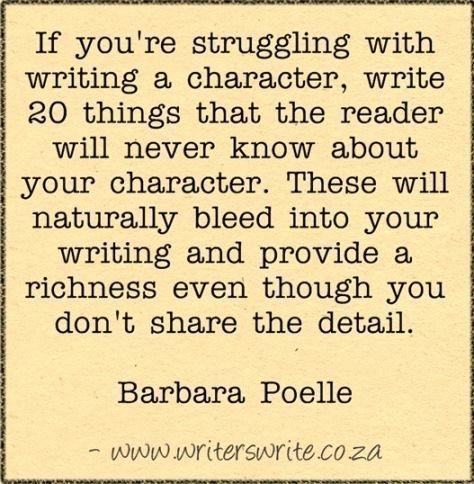 For more frequent updates, writing tips, and funnies, follow on Facebook, Twitter, Google+,
For more frequent updates, writing tips, and funnies, follow on Facebook, Twitter, Google+,
YouTube, Pinterest, Tumblr, GoodReads, and/or Instagram.
SUBMISSION OPPORTUNITIES:
University of Iowa Press: Two publication awards are given annually by University of Iowa Press for first collections of short fiction. Writers who have not published a book of fiction are eligible. Due Sep. 30.The Filid Chapbook: The Filid Chapbook is looking for BLUE content. (The color, the music, the range of feeling—we're looking for explorations of the theme). We accept poetry, nonfiction, short fiction, visual art, and pretty well anything else that interests us. Due Sep. 26.Clockhouse Magazine: Clockhouse, a literary journal published in partnership with Goddard College, seeks submissions from emerging and established writers for its 2015 issue. Clockhouse is devoted to a variety of genres, publishing fiction, poetry, memoir, creative nonfiction, and dramatic work. Due Dec. 1
SPOTLIGHTS: 5 Systems You Need to Skyrocket Your Freelance Writing Career (Write to Done) 8 Reasons I Visit Your Blog (ReadingTeen.net)There Is No Horse And Cart; On Finding Success as a Writer (Writer Unboxed) Book Marketing With Visual Content: 7 Ways to Stand Out With Images (The Creative Penn) How To Turn Your Written Content Into Video Content (The Future of Ink)4 Ways To Create Sticky Content (Jeff Bullas)
This, for me, is one of the best ways I know to figure out how I can grow and improve as a writer on the internet. I want to know what you think, and what is most beneficial and interesting to you. Yes YOU. I would love to hear your answers to all or any of the following questions.
1. What blogs do you visit most? I basically want to know which blogs are your favorite (in addition to this one, of course ;) and I'm thinking that one of the best ways to gauge how helpful a blog is for you is to see how often you find yourself going back. So which blogs do you go back to again and again? Give me your top two or three, or more!
2. What book are you reading now, and how/where did you discover it?
3. How do you feel about the following on author blogs: Personal stories/essays, flash fiction, poetry, photo essay (ie. pics from the bloggers personal life and excursions) or "home-made" comics/illustrations (kinda like Hyperbole and a Half or Debbie Ohi).
4. Do you regularly watch any YouTube channels? If so, which ones?
5. Are you currently subscribed to any author newsletters?
6. What Reader do you use for reading blogs? Bloglovin? Feedly? FriendConnect? Something else? Or do you visit blogs one by one?
7. What is the number one thing you spend time doing on the internet? Facebook? Pinterest? Blog reading? Shopping? YouTube videos? Reading fan fic? Gaming?
8. Any ideas or suggested changes that you think would make this blog more useful, entertaining, or easier to read? Seriously, I can take it. If there's something you love from other blogs that you think could be incorporated here, let me know. If there's something here that bothers you, let me know. Any random thoughts? Let me know.
Thank you so much for taking the time to answer any or all of these questions. I truly appreciate it, and want to hear as many ideas and perspectives as I can to make this blog the most helpful and entertaining for you that it can possibly be. Your feedback is always welcome and valued. Thanks again, I very much look forward to hearing what you have to say!
Write on!
Sarah Allen
This Week on Social Media:
 For more frequent updates, writing tips, and funnies, follow on Facebook, Twitter, Google+,
For more frequent updates, writing tips, and funnies, follow on Facebook, Twitter, Google+, YouTube, Pinterest, Tumblr, GoodReads, and/or Instagram.
SUBMISSION OPPORTUNITIES:
University of Iowa Press: Two publication awards are given annually by University of Iowa Press for first collections of short fiction. Writers who have not published a book of fiction are eligible. Due Sep. 30.The Filid Chapbook: The Filid Chapbook is looking for BLUE content. (The color, the music, the range of feeling—we're looking for explorations of the theme). We accept poetry, nonfiction, short fiction, visual art, and pretty well anything else that interests us. Due Sep. 26.Clockhouse Magazine: Clockhouse, a literary journal published in partnership with Goddard College, seeks submissions from emerging and established writers for its 2015 issue. Clockhouse is devoted to a variety of genres, publishing fiction, poetry, memoir, creative nonfiction, and dramatic work. Due Dec. 1
SPOTLIGHTS: 5 Systems You Need to Skyrocket Your Freelance Writing Career (Write to Done) 8 Reasons I Visit Your Blog (ReadingTeen.net)There Is No Horse And Cart; On Finding Success as a Writer (Writer Unboxed) Book Marketing With Visual Content: 7 Ways to Stand Out With Images (The Creative Penn) How To Turn Your Written Content Into Video Content (The Future of Ink)4 Ways To Create Sticky Content (Jeff Bullas)
Published on August 25, 2014 05:00
August 18, 2014
4 Ways Writers Can Go "Back To School"
This time of year always gets me thinking about that wonderful line from You've Got Mail when they're talking about school supplies and "bouquets of sharpened pencils." It's been a few years since I've been a registered student, but I do get nostalgic for some of those school days. School is awesome.
Even if we're not technically students at an official school, this time of year can inspire us to further our education. I personally feel like the only "hopeless" person is the person who feels they have nothing left to learn. We are always learning, always improving. So without official school, what can we writers do to keep finding teachers, and keep learning?
1. Read great writing books. There are so many options out there. Just head to the Writing and Publishing section of your local Barnes and Noble, and you'll see. A classic, and my personal favorite, is Stephen King's On Writing. Plot and Structure by James Scott Bell was also incredibly helpful.
2. Listen to TED Talks. These really are one of the best ways to casually continue one's education. There are thousands of TED talks uploaded, each one inspiration and informative, even (especially) ones that seemingly have nothing to do with writing. They are fun to listen to while at work or in the car. Here are a couple of my favorites:
3. Watch educational videos on YouTube. In the same vein as TED Talks, YouTube provides an endless conglomeration of incredible educational videos on basically any topic. Whether you are doing research on a particular topic for a novel or looking to broaden your education in general, YouTube is a great place to start. My favorite channels for this are CrashCourse by the indefatigable John and Hank Green, and VSauce.
4. Add more blogs to your subscription. Whatever blog subscription you use, find a couple more blogs that do great posts and add them to your feed. That way you are constantly learning from active participants in your field. See the spotlight section below and in other posts for some recommendations.
That's all for today, but I'm excited to see what ideas you guys have. What resources have helped you continue your writerly education?
Write on!
This Week on Social Media:
 For more frequent updates, writing tips, and funnies, follow on Facebook, Twitter, Google+,
For more frequent updates, writing tips, and funnies, follow on Facebook, Twitter, Google+,
YouTube, Pinterest, Tumblr, GoodReads, and/or Instagram.
SUBMISSION OPPORTUNITIES:
Chattahoochee Review: The Chattahoochee Review seeks submissions for its Fall/Winter 2014 double issue with a special focus on “Skin.” Literal and figurative explorations of the theme welcome. Due Sep. 1The Conium Review: The Conium Review Online Compendium seeks flash fiction. Work must be unpublished. Simultaneous submissions are allowed. No reading fee. Due Oct. 1The Minetta Review: The Minetta Review is a literary and arts publication managed by undergraduate students at New York University. If you are a poet, proser, prose-poet, painter, sculptor, photographer, digital illustrator—otherwise an experimenter of combining word and visual art—the Minetta Review staff encourages you to submit your work. Due Nov. 15Writers Digest-Your Story 61: Write the opening sentence (just one, of 25 words or fewer) to a story based on the photo to the left. You can be funny, poignant, witty, etc.; it is, after all, your story. Due Oct. 13SPOTLIGHTS:Rules of Writing According to 20 Famous Writers (Writers Digest)5 Creative Ways to Market Your Book (Author Marketing Experts, Inc.)89 Book Marketing Ideas That Will Change Your Life (Author Media)5 Protagonists Readers Hate (Anne R. Allen)
Even if we're not technically students at an official school, this time of year can inspire us to further our education. I personally feel like the only "hopeless" person is the person who feels they have nothing left to learn. We are always learning, always improving. So without official school, what can we writers do to keep finding teachers, and keep learning?
1. Read great writing books. There are so many options out there. Just head to the Writing and Publishing section of your local Barnes and Noble, and you'll see. A classic, and my personal favorite, is Stephen King's On Writing. Plot and Structure by James Scott Bell was also incredibly helpful.
2. Listen to TED Talks. These really are one of the best ways to casually continue one's education. There are thousands of TED talks uploaded, each one inspiration and informative, even (especially) ones that seemingly have nothing to do with writing. They are fun to listen to while at work or in the car. Here are a couple of my favorites:
3. Watch educational videos on YouTube. In the same vein as TED Talks, YouTube provides an endless conglomeration of incredible educational videos on basically any topic. Whether you are doing research on a particular topic for a novel or looking to broaden your education in general, YouTube is a great place to start. My favorite channels for this are CrashCourse by the indefatigable John and Hank Green, and VSauce.
4. Add more blogs to your subscription. Whatever blog subscription you use, find a couple more blogs that do great posts and add them to your feed. That way you are constantly learning from active participants in your field. See the spotlight section below and in other posts for some recommendations.
That's all for today, but I'm excited to see what ideas you guys have. What resources have helped you continue your writerly education?
Write on!
This Week on Social Media:
 For more frequent updates, writing tips, and funnies, follow on Facebook, Twitter, Google+,
For more frequent updates, writing tips, and funnies, follow on Facebook, Twitter, Google+, YouTube, Pinterest, Tumblr, GoodReads, and/or Instagram.
SUBMISSION OPPORTUNITIES:
Chattahoochee Review: The Chattahoochee Review seeks submissions for its Fall/Winter 2014 double issue with a special focus on “Skin.” Literal and figurative explorations of the theme welcome. Due Sep. 1The Conium Review: The Conium Review Online Compendium seeks flash fiction. Work must be unpublished. Simultaneous submissions are allowed. No reading fee. Due Oct. 1The Minetta Review: The Minetta Review is a literary and arts publication managed by undergraduate students at New York University. If you are a poet, proser, prose-poet, painter, sculptor, photographer, digital illustrator—otherwise an experimenter of combining word and visual art—the Minetta Review staff encourages you to submit your work. Due Nov. 15Writers Digest-Your Story 61: Write the opening sentence (just one, of 25 words or fewer) to a story based on the photo to the left. You can be funny, poignant, witty, etc.; it is, after all, your story. Due Oct. 13SPOTLIGHTS:Rules of Writing According to 20 Famous Writers (Writers Digest)5 Creative Ways to Market Your Book (Author Marketing Experts, Inc.)89 Book Marketing Ideas That Will Change Your Life (Author Media)5 Protagonists Readers Hate (Anne R. Allen)
Published on August 18, 2014 05:00
August 11, 2014
10 Ways to Motivate Yourself to Write
We all have those days.
So many things can zap your motivation. Maybe you got five hours of sleep. Maybe its a gorgeous day outside. Maybe it was a particularly hard day at work. Maybe its none of these things but just general blah-ness.
So what do you do when this happens? Muses are known for their fickle nature, and we can be more productive when we don't have to rely on them for our motivation. We want to to be able to be productive even when the muse seems to be missing.
Here are a few ways that help me rustle up some motivation when the normal flow has run dry.
1. Talk to other writers: This is one of the most helpful strategies for me when my motivation is lacking. On those days, often talking to other writers can sort of give you vicarious motivation. Talking to my writer friends, almost more than anything else, helps me re-feel my excitement, and remember what I love about writing, and why I'm doing this. On a specific level, even though I am definitely on the Say-Nothing-About-My-Project-Till-Its-Done end of the spectrum, talking vaguely about my projects helps me remember the exciting parts and the bits I super love. I firmly believe we humans are not solitary creatures, even us writers, and talking with other writers who relate to what we're going to can be incredibly valuable.
And remember, even if you don't know many writers personally, this is one of the best things about the internet and the blogosphere. There is a whole online community of writers who are willing to support you. (And in case any of you think you don't know many online writers either, my email is on the contact page and all my social media is at the buttons to the left :)
2. Visit a bookstore or library: This is one of my go-to strategies when bad days happen. I head on over to my local Barnes and Noble and just spend an hour or so running my fingers over spines of all the beautiful books. I read cover copy and look at pretty cover images. This is where we can physically visualize our end goal. At least that's how I feel. We can see the store shelves where our book would be. We can imagine our book next to all the others. We can see the folks wandering the store, and remember that the book they're lifting off the shelves might one day be ours. And that can be powerful motivation indeed.
3. Listen to pump-up music: I think music is a force that can change ones mood faster than almost anything else. Music sets its own tone, no matter where you are. Music can help when you need a quick boost. What's your favorite pump-up music? Here's one of my favorite pump-up songs, called This Year by the phenomenal Mountain Goats.
4. Read a bit of your favorite book: Sometimes just holding your favorite childhood book can make a bad day better. I just like the look of my old edition of The Lion, The Witch, and the Wardrobe. I love reading paragraphs from Jane Austen or Charlotte Bronte or Wallace Stegner. Or reading chapter 33 of Harry Potter and the Deathly Hallows. (Seriously. That Snape chapter makes the list of like the greatest things in all of literature. Next to the artwork by Don Wood in Piggies.) Best books are like comfort food. So pick up a Boxcar Children's book and remember why you love this in the first place.

5. Take a cat nap: Our mental health and physical bodies are very connected. Sometimes it's no longer an issue of mind over matter; sometimes your body is just tired. So take a quick nap. It can do wonders. Especially if you do it with an actual cat.

6. Go on a dog walk: Meaning take a bit of time out in nature. I mean, it seems kind of counter-intuitive to recommend going outside when we're trying to get motivation to keep ourselves in a chair at our desks, but sometimes counter-intuitive works. Sometimes we just need a breath of fresh air to clear our heads. And like step 5, it works best with an actual dog :)
7. Read a poem: Imagine a concert pianist that feels blocked. One of the best things for that pianist to do might be to go back to the basics and start running scales. In a lot of ways reading or writing poetry can do that for a writer. I mean, its a little different because poetry is a full piece of art in and of itself, and by no means "basic." But poetry can bring you to sort of the core of literature better than anything else. It's word-power in its most condensed form. That can be a powerful punch and be like ice-water on a sleeping muse.
8. Work in a different medium: Maybe you like to sketch or play guitar or fiddle with photo-shop. Sometimes making art in a medium other than words can be the refresher you need to get out of your slump. It can be rejuvenating. Go crochet or work in your garden or buy sculpting clay even you never have before. Working in a new way or place can hopefully get the creative juices flowing that you can then use as fuel when you go back to your writing.
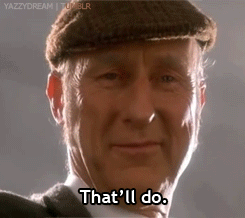
9. Watch a movie: I am a firm believer in the power of cinema. I think watching movies or tv shows on a slow motivation day serves a dual purpose. It can be creatively inspiring. I have gotten some of my best ideas from my favorite movies and shows. But since watching movies takes less mental effort, it can also be one of the best ways to give your brain a break, and sometimes that's just what you need. At least I do. I find movies the best solution for when I'm feeling worn down. Like I said, it's the best combination of mental break and creative stimulation. So on your next down day pop in Babe. Or Eternal Sunshine of the Spotless Mind. Or re-watch an entire season of The Office. I won't judge.
10. Sit down, one sentence: Okay. The thing is, all of these strategies can help, but what it really comes down to is just getting words on a page. Sometimes that can feel incredibly overwhelming, like hiking a mountain. But the longest hike starts with one step, and that's all you have to think about. All you have to think about is sitting down and putting out one sentence. Just one. Just start with that. If you're having a really drained day and need to stop after one sentence, let yourself do that. Then go on a walk with a dog and nap with a cat and pop in a Disney movie. But more often than not, I'm betting after one sentence another will come. And maybe even another. Maybe even an entire paragraph, even a page, which is a huge victory on some days.
I hope these strategies help. What do you do to motivate yourself to write?
Write on!
This Week on Social Media:
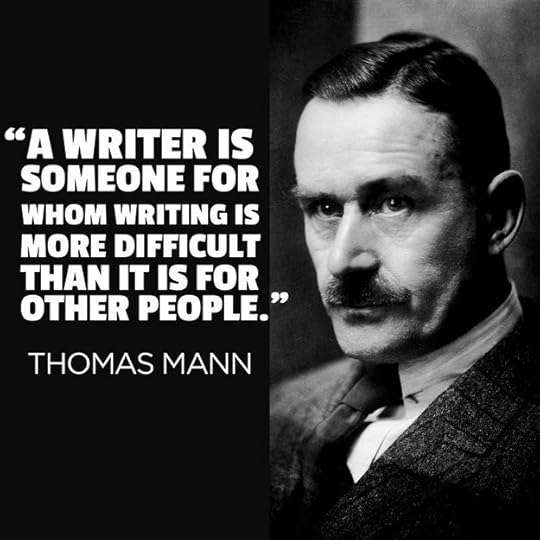
For more frequent updates, writing tips, and funnies, follow on Facebook, Twitter,
Google+, YouTube, Pinterest, Tumblr, GoodReads, and/or Instagram.
SUBMISSION OPPORTUNITIES:
Dogwood Magazine: Dogwood: A Journal of Poetry and Prose will begin accepting entries of fiction, nonfiction, and poetry for the 2014-2015 issue and contest on July 1, with a deadline of Sept. 5. A prize of $1000 goes to one winning entry, with two additional entries receiving $250 each. Due Sep. 1New Delta Review: New Delta Review seeks entries for the second annual Ryan R. Gibbs Award for Short Fiction, a contest judged by the amazing Roxane Gay, author of An Untamed State and Bad Feminist. We are looking for a full narrative in a small package (1500 words or less). Winner will receive a $500 prize and publication in the winter issue of New Delta Review. Due Oct. 4.Medical Literary Messenger: The Medical Literary Messenger is now accepting submissions of poetry, fiction, nonfiction, photography, and visual art for our Fall 2014 issue. We are an online journal that promotes humanism and healing by publishing honest and engaging narratives by physicians, patients, and caretakers. Due Sept. 1River Teeth Nonfiction Book Contest: River Teeth's editors and editorial board conduct a yearly national contest to identify the best book-length manuscript of literary nonfiction. All manuscripts are screened by the head editors of River Teeth. The winner will receive $1,000 and publication by The University of New Mexico Press. Due Oct. 15
SPOTLIGHTS:How to Promote Yourself and Your Books on Social Media Without Feeling Like a Soul-Selling, Sleaze-Sucking Sime-Glob (Chuck Sambuchino)How I Became a Successful Freelance Writer After Failing in Year One (Make a Living Writing)8 Writer Tips to Keep Your Butt in the Chair (The Kill Zone)How To Land High-Paying Gigs in the Christian Market (Writers Digest)How To Get Your Short Stories Published in Lit Mags (Writer Unboxed)
So many things can zap your motivation. Maybe you got five hours of sleep. Maybe its a gorgeous day outside. Maybe it was a particularly hard day at work. Maybe its none of these things but just general blah-ness.
So what do you do when this happens? Muses are known for their fickle nature, and we can be more productive when we don't have to rely on them for our motivation. We want to to be able to be productive even when the muse seems to be missing.
Here are a few ways that help me rustle up some motivation when the normal flow has run dry.
1. Talk to other writers: This is one of the most helpful strategies for me when my motivation is lacking. On those days, often talking to other writers can sort of give you vicarious motivation. Talking to my writer friends, almost more than anything else, helps me re-feel my excitement, and remember what I love about writing, and why I'm doing this. On a specific level, even though I am definitely on the Say-Nothing-About-My-Project-Till-Its-Done end of the spectrum, talking vaguely about my projects helps me remember the exciting parts and the bits I super love. I firmly believe we humans are not solitary creatures, even us writers, and talking with other writers who relate to what we're going to can be incredibly valuable.
And remember, even if you don't know many writers personally, this is one of the best things about the internet and the blogosphere. There is a whole online community of writers who are willing to support you. (And in case any of you think you don't know many online writers either, my email is on the contact page and all my social media is at the buttons to the left :)
2. Visit a bookstore or library: This is one of my go-to strategies when bad days happen. I head on over to my local Barnes and Noble and just spend an hour or so running my fingers over spines of all the beautiful books. I read cover copy and look at pretty cover images. This is where we can physically visualize our end goal. At least that's how I feel. We can see the store shelves where our book would be. We can imagine our book next to all the others. We can see the folks wandering the store, and remember that the book they're lifting off the shelves might one day be ours. And that can be powerful motivation indeed.
3. Listen to pump-up music: I think music is a force that can change ones mood faster than almost anything else. Music sets its own tone, no matter where you are. Music can help when you need a quick boost. What's your favorite pump-up music? Here's one of my favorite pump-up songs, called This Year by the phenomenal Mountain Goats.
4. Read a bit of your favorite book: Sometimes just holding your favorite childhood book can make a bad day better. I just like the look of my old edition of The Lion, The Witch, and the Wardrobe. I love reading paragraphs from Jane Austen or Charlotte Bronte or Wallace Stegner. Or reading chapter 33 of Harry Potter and the Deathly Hallows. (Seriously. That Snape chapter makes the list of like the greatest things in all of literature. Next to the artwork by Don Wood in Piggies.) Best books are like comfort food. So pick up a Boxcar Children's book and remember why you love this in the first place.

5. Take a cat nap: Our mental health and physical bodies are very connected. Sometimes it's no longer an issue of mind over matter; sometimes your body is just tired. So take a quick nap. It can do wonders. Especially if you do it with an actual cat.

6. Go on a dog walk: Meaning take a bit of time out in nature. I mean, it seems kind of counter-intuitive to recommend going outside when we're trying to get motivation to keep ourselves in a chair at our desks, but sometimes counter-intuitive works. Sometimes we just need a breath of fresh air to clear our heads. And like step 5, it works best with an actual dog :)
7. Read a poem: Imagine a concert pianist that feels blocked. One of the best things for that pianist to do might be to go back to the basics and start running scales. In a lot of ways reading or writing poetry can do that for a writer. I mean, its a little different because poetry is a full piece of art in and of itself, and by no means "basic." But poetry can bring you to sort of the core of literature better than anything else. It's word-power in its most condensed form. That can be a powerful punch and be like ice-water on a sleeping muse.
8. Work in a different medium: Maybe you like to sketch or play guitar or fiddle with photo-shop. Sometimes making art in a medium other than words can be the refresher you need to get out of your slump. It can be rejuvenating. Go crochet or work in your garden or buy sculpting clay even you never have before. Working in a new way or place can hopefully get the creative juices flowing that you can then use as fuel when you go back to your writing.

9. Watch a movie: I am a firm believer in the power of cinema. I think watching movies or tv shows on a slow motivation day serves a dual purpose. It can be creatively inspiring. I have gotten some of my best ideas from my favorite movies and shows. But since watching movies takes less mental effort, it can also be one of the best ways to give your brain a break, and sometimes that's just what you need. At least I do. I find movies the best solution for when I'm feeling worn down. Like I said, it's the best combination of mental break and creative stimulation. So on your next down day pop in Babe. Or Eternal Sunshine of the Spotless Mind. Or re-watch an entire season of The Office. I won't judge.
10. Sit down, one sentence: Okay. The thing is, all of these strategies can help, but what it really comes down to is just getting words on a page. Sometimes that can feel incredibly overwhelming, like hiking a mountain. But the longest hike starts with one step, and that's all you have to think about. All you have to think about is sitting down and putting out one sentence. Just one. Just start with that. If you're having a really drained day and need to stop after one sentence, let yourself do that. Then go on a walk with a dog and nap with a cat and pop in a Disney movie. But more often than not, I'm betting after one sentence another will come. And maybe even another. Maybe even an entire paragraph, even a page, which is a huge victory on some days.
I hope these strategies help. What do you do to motivate yourself to write?
Write on!
This Week on Social Media:

For more frequent updates, writing tips, and funnies, follow on Facebook, Twitter,
Google+, YouTube, Pinterest, Tumblr, GoodReads, and/or Instagram.
SUBMISSION OPPORTUNITIES:
Dogwood Magazine: Dogwood: A Journal of Poetry and Prose will begin accepting entries of fiction, nonfiction, and poetry for the 2014-2015 issue and contest on July 1, with a deadline of Sept. 5. A prize of $1000 goes to one winning entry, with two additional entries receiving $250 each. Due Sep. 1New Delta Review: New Delta Review seeks entries for the second annual Ryan R. Gibbs Award for Short Fiction, a contest judged by the amazing Roxane Gay, author of An Untamed State and Bad Feminist. We are looking for a full narrative in a small package (1500 words or less). Winner will receive a $500 prize and publication in the winter issue of New Delta Review. Due Oct. 4.Medical Literary Messenger: The Medical Literary Messenger is now accepting submissions of poetry, fiction, nonfiction, photography, and visual art for our Fall 2014 issue. We are an online journal that promotes humanism and healing by publishing honest and engaging narratives by physicians, patients, and caretakers. Due Sept. 1River Teeth Nonfiction Book Contest: River Teeth's editors and editorial board conduct a yearly national contest to identify the best book-length manuscript of literary nonfiction. All manuscripts are screened by the head editors of River Teeth. The winner will receive $1,000 and publication by The University of New Mexico Press. Due Oct. 15
SPOTLIGHTS:How to Promote Yourself and Your Books on Social Media Without Feeling Like a Soul-Selling, Sleaze-Sucking Sime-Glob (Chuck Sambuchino)How I Became a Successful Freelance Writer After Failing in Year One (Make a Living Writing)8 Writer Tips to Keep Your Butt in the Chair (The Kill Zone)How To Land High-Paying Gigs in the Christian Market (Writers Digest)How To Get Your Short Stories Published in Lit Mags (Writer Unboxed)
Published on August 11, 2014 05:00
August 4, 2014
5 Tips for Writing 3 Dimensional Characters
I submit to you that writing well-rounded and complex characters is maybe the most important part of writing a story. Some may say that a page-turning plot is the most important, but engaging characters are what pull the reader in and keep your story in the reader's mind long after they read the last page. I have read plenty of books and seen plenty of movies where the plots were slow, but because I cared so much about what happened to the characters, I was hooked the entire time. And vice versa. I have read plenty of books with thrilling plots that I raced through, then when I was done, threw the book over my shoulder and could hardly remember anything I'd just read. (*ahem* Da Vinci Code anyone? *ahem*)
So how do we create characters that live and breathe on the page, and stay with the reader for a long time after they're gone? How do we write characters that feel real? I'm definitely still working on improving this myself, but I thought I'd list a few things I've seen done in my favorite books that might help all of us write more three dimensional characters.
1. Characters are NOT place-holders: I recently saw a movie that was quite well done, yet many of the characters felt flat. I thought about it that night and realized that the issue was that the characters felt like place-holders rather than unique individuals. The story was compelling, but the characters were used almost like moving pieces, there mostly to make the story's point. In other words, even for your secondary characters, give them their own unique back-stories and motivations. For example, if you have a drunk father, remember he is his own unique character, not simply "The Drunk Father." Your rebellious teenager is his own unique character, not just "The Rebellious Teenager." This seems like an obvious, overly-general strategy, but I know that for me just keeping this in mind as I write has helped a lot.
2. Triple-check your dialog: One of the quickest ways I've found that characters can fall flat is through poorly written dialog. My general rule of thumb that holds particularly true for dialog is that if it sounds even remotely like something I've heard before, re-write. Read your dialog out-loud, and then if possible, have someone else read it out-loud to you. Sometimes it helps me to physically loosen up, shake my shoulders out, stretch my arms, and then speak in my own, normal way of speaking, the lines I need my characters to say. Hopefully these strategies help us end up with natural dialog that makes our characters sound real.
3. Make sure there's an internal goal: We all know that our characters need to be struggling to accomplish something. Sometimes it's making it to a dance, sometimes its running away from wolves, sometimes its saving the city or country or world from the evil super-villain. These goals are what pull the story forward. But remember that in addition to these plot-moving goals, there also needs to be some very strong internal motivation. Even saving-the-world stakes need to be made personal in order for us to connect with the character.

My favorite example of this done brilliantly is the character of Russel from the Pixar movie Up! What is his external, forward-moving motivation? He wants his scout badge. He wants it so badly he's flying around in a house with a grumpy old man in order to get it. But why does he want it so badly? That is the key, and what Pixar always does so brilliantly. He wants it because he wants that connection with his dad. This is only directly referred to in a few short lines, but those lines really connect us as an audience with his character and really make us feel for him.
4. Give them a flaw: This is another often-stated bit of advice, but it is important. Nobody is perfect, and the characters won't feel real if you try to make them that way. Sometimes this flaw is the cause of all their trouble, sometimes its just something that makes it that much harder to solve the original problem. Whether the flaw is a major obstacle or a handicap, watching the characters strive to overcome it helps them feel real to us.

Think of Jane Austen's Emma. She is a witty, engaging character, but can be incredibly nosy and condescending. In other words, she is majorly flawed. But we see the problems that arise from these flaws, and because Emma does too, and acknowledges that she has lots of improving to do, we can not only forgive her but feel for her and wish the best for her. This imperfection and struggle makes her feel real.
5. How do they feel about other characters?: Perhaps one of the quickest ways to add dimension to our characters is to put them in context with other characters. Going back to our Jane Austen example, think of Mr. Knightley. It's his interactions with Emma that show us who he truly is. We see him check and mentor Emma as well as stick with her through all her mistakes, and we come to love him for it. That's the kind of man he truly is, and it's his relationship with Emma that shows us.

What about characters who are less pleasant than Mr. Knightley? Characters who kind of hate people? Think of Dr. Gregory House. Admittedly his caustic misanthropy can be kind of hilarious (another way of adding dimension). But if that was his only note, don't you think it would get boring? It's House's moments of vulnerability, when we see how much he really truly needs and cares for other people (i.e. Wilson) that give him such beautiful complexity.
Can you think of other tips for writing 3 dimensional characters? What are your favorite examples of well-rounded characters?
Write on!
This Week on Social Media:
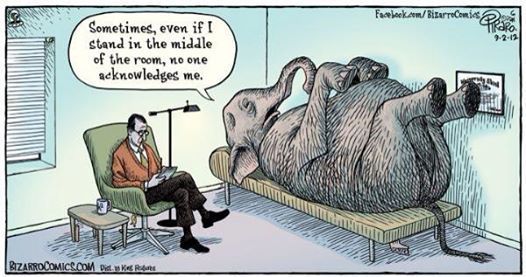
For more frequent updates, writing tips, and funnies, follow on Facebook, Twitter, Google+, YouTube, Pinterest, Tumblr, GoodReads, and/or Instagram.
SUBMISSION OPPORTUNITIES:
Chicken Soup for the Soul: Christmas Stories. Due Aug. 30.Building Red Anthology: Walrus Publishing, an independent press from St. Louis, Missouri, is now accepting submissions for our sci/fi anthology, Building Red-The Colonization of Mars. Due Nov. 1.The Birds We Piled Loosely: The Birds We Piled Loosely is a new online literary magazine looking for work by published and unpublished authors. We are a quarterly magazine focused on poetry, flash fiction/creative nonfiction, photography, and art. Our only requirement is work that surprises and excites us. Due Aug. 31.Emerge Literary Journal: Emerge Literary Journal is an annual print journal featuring poetry and flash fiction dedicated to emerging writers and their words. Due Oct. 1.Wag's Revue: A prize of $1,000 and publication in Wag's Revue is given twice yearly for a poem or group of poems, a short story, or an essay. The editors will judge. Using the online submission system, submit up to 10 pages of poetry or up to 10,000 words of prose with a $20 entry by August 31.
SPOTLIGHTS:Common Picture Book Mistakes (Adventures in Agentland)7 Things To Do When You Don't Feel Like Writing (Daily Writing Tips)Lost Your Motivation to Write? (Write to Done)Great Headline Ideas (Author Marketing Experts)25 Tips for Writing a Winning Short Story (The Kill Zone)
So how do we create characters that live and breathe on the page, and stay with the reader for a long time after they're gone? How do we write characters that feel real? I'm definitely still working on improving this myself, but I thought I'd list a few things I've seen done in my favorite books that might help all of us write more three dimensional characters.
1. Characters are NOT place-holders: I recently saw a movie that was quite well done, yet many of the characters felt flat. I thought about it that night and realized that the issue was that the characters felt like place-holders rather than unique individuals. The story was compelling, but the characters were used almost like moving pieces, there mostly to make the story's point. In other words, even for your secondary characters, give them their own unique back-stories and motivations. For example, if you have a drunk father, remember he is his own unique character, not simply "The Drunk Father." Your rebellious teenager is his own unique character, not just "The Rebellious Teenager." This seems like an obvious, overly-general strategy, but I know that for me just keeping this in mind as I write has helped a lot.
2. Triple-check your dialog: One of the quickest ways I've found that characters can fall flat is through poorly written dialog. My general rule of thumb that holds particularly true for dialog is that if it sounds even remotely like something I've heard before, re-write. Read your dialog out-loud, and then if possible, have someone else read it out-loud to you. Sometimes it helps me to physically loosen up, shake my shoulders out, stretch my arms, and then speak in my own, normal way of speaking, the lines I need my characters to say. Hopefully these strategies help us end up with natural dialog that makes our characters sound real.
3. Make sure there's an internal goal: We all know that our characters need to be struggling to accomplish something. Sometimes it's making it to a dance, sometimes its running away from wolves, sometimes its saving the city or country or world from the evil super-villain. These goals are what pull the story forward. But remember that in addition to these plot-moving goals, there also needs to be some very strong internal motivation. Even saving-the-world stakes need to be made personal in order for us to connect with the character.

My favorite example of this done brilliantly is the character of Russel from the Pixar movie Up! What is his external, forward-moving motivation? He wants his scout badge. He wants it so badly he's flying around in a house with a grumpy old man in order to get it. But why does he want it so badly? That is the key, and what Pixar always does so brilliantly. He wants it because he wants that connection with his dad. This is only directly referred to in a few short lines, but those lines really connect us as an audience with his character and really make us feel for him.
4. Give them a flaw: This is another often-stated bit of advice, but it is important. Nobody is perfect, and the characters won't feel real if you try to make them that way. Sometimes this flaw is the cause of all their trouble, sometimes its just something that makes it that much harder to solve the original problem. Whether the flaw is a major obstacle or a handicap, watching the characters strive to overcome it helps them feel real to us.

Think of Jane Austen's Emma. She is a witty, engaging character, but can be incredibly nosy and condescending. In other words, she is majorly flawed. But we see the problems that arise from these flaws, and because Emma does too, and acknowledges that she has lots of improving to do, we can not only forgive her but feel for her and wish the best for her. This imperfection and struggle makes her feel real.
5. How do they feel about other characters?: Perhaps one of the quickest ways to add dimension to our characters is to put them in context with other characters. Going back to our Jane Austen example, think of Mr. Knightley. It's his interactions with Emma that show us who he truly is. We see him check and mentor Emma as well as stick with her through all her mistakes, and we come to love him for it. That's the kind of man he truly is, and it's his relationship with Emma that shows us.

What about characters who are less pleasant than Mr. Knightley? Characters who kind of hate people? Think of Dr. Gregory House. Admittedly his caustic misanthropy can be kind of hilarious (another way of adding dimension). But if that was his only note, don't you think it would get boring? It's House's moments of vulnerability, when we see how much he really truly needs and cares for other people (i.e. Wilson) that give him such beautiful complexity.
Can you think of other tips for writing 3 dimensional characters? What are your favorite examples of well-rounded characters?
Write on!
This Week on Social Media:

For more frequent updates, writing tips, and funnies, follow on Facebook, Twitter, Google+, YouTube, Pinterest, Tumblr, GoodReads, and/or Instagram.
SUBMISSION OPPORTUNITIES:
Chicken Soup for the Soul: Christmas Stories. Due Aug. 30.Building Red Anthology: Walrus Publishing, an independent press from St. Louis, Missouri, is now accepting submissions for our sci/fi anthology, Building Red-The Colonization of Mars. Due Nov. 1.The Birds We Piled Loosely: The Birds We Piled Loosely is a new online literary magazine looking for work by published and unpublished authors. We are a quarterly magazine focused on poetry, flash fiction/creative nonfiction, photography, and art. Our only requirement is work that surprises and excites us. Due Aug. 31.Emerge Literary Journal: Emerge Literary Journal is an annual print journal featuring poetry and flash fiction dedicated to emerging writers and their words. Due Oct. 1.Wag's Revue: A prize of $1,000 and publication in Wag's Revue is given twice yearly for a poem or group of poems, a short story, or an essay. The editors will judge. Using the online submission system, submit up to 10 pages of poetry or up to 10,000 words of prose with a $20 entry by August 31.
SPOTLIGHTS:Common Picture Book Mistakes (Adventures in Agentland)7 Things To Do When You Don't Feel Like Writing (Daily Writing Tips)Lost Your Motivation to Write? (Write to Done)Great Headline Ideas (Author Marketing Experts)25 Tips for Writing a Winning Short Story (The Kill Zone)
Published on August 04, 2014 05:00
July 28, 2014
6 Things Writers Can Learn From Scrubs
I recently finished going through the series Scrubs.
Guys, I'm a little in love.
With all of them. Seriously, the writers and actors on this show knew exactly what they were doing. The deftness with which they moved from gut-busting laughter to tear-jerking poignancy was mind-blowing. And they did it every episode. So what lessons can we writers take from this hilarious and well-done show?
1. Sarcasm + Vulnerability = AWESOME. Dr. Perry Cox was my first love of the show. I have serious thing for grumpy, sarcastic, hilarious old men who you just know have a mushy, kicked puppy center. In other words, Dr. Cox was basically tailor made for me. Somehow characters who are for the most part hardened and witty and then stumble into these desperately vulnerable moments make both the wit and the vulnerability that much more piercing. It is really this character (and the genius that is John C. McGinley) that can take the show from this

to this

and back again faster than you can say Percival Ulysses Cox.
2. Running gags make the audience feel included. I don't know about you guys, but this show made me want to Eagle and drink appletinis and start giving people titled high fives. Because I could laugh along at the inside jokes, I felt included. These guys were my friends. And I think this can work in books too, including stand alone novels. When you know the characters' inside jokes, you start feeling like you know them intimately.
3. Let your losers win one every once in a while. Often we have characters that spend the majority of the story being downtrodden. Often its humorous, like with Eeyore, and my maybe other favorite character in Scrubs, Ted Buckland. Yes, I admit, it's funny to see him be Bob Kelso's whipping boy, but seeing him get a win is extremely satisfying. And kinda freaking adorable.
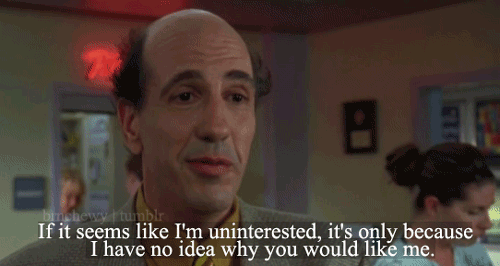
4. Know what drinks your character likes. Saying that JD drinks appletinis is basically a shorthand. We get a glimpse of who he is just by that detail alone. It's all those little details and quirks that make us as an audience feel like we really know the character. It's like how, if you notice, 93% of the time the camera pans to Ted, he's doing this:
 That constant hair-pulling, that little appletini, almost tells us more about these guys than entire paragraphs could do.
That constant hair-pulling, that little appletini, almost tells us more about these guys than entire paragraphs could do.
5. There's just something about buddies. We love watching their antics, and rooting for them as they conquer the world together. Watching a buddy pair that you just know will never, ever be separated...there's just something so comforting and so bolstering about that. And there's just no buddy pair...okay we'll say it, guy love, quite like Turk and JD.

6. Feminine strength comes in different forms. There was no shortage of strong women on this show. I mean, in their own way, every woman was strong. Carla was strongly grounded in her identity. Jordan was strong in her sharp and wacky ferocity. And even Elliot was strong in owning up to her own neurosis and not letting any of them stop her for long. So just remember that "strong woman" is not a character type, because every strong woman is strong in their own unique way. When you recognize that, it might even help you dig deep into your female leads to see what special thing about them actually provides them their strength.

I hope that helps, even if you aren't super familiar with the show. For those of you who are, are there any other lessons for writers that you might take from it?
Write on!
OPPORTUNITIES:
North Dakota Quarterly: "North Dakota Quarterly, an interdisciplinary, peer-reviewed journal, seeks contributions for a special issue on the theme of “Slow.” We invite nonfiction essays, short fiction pieces, poems, and artistic images that address or are inspired by this concept of “slow.”..." Due Oct. 1.The Drunken Odyssey: "The Drunken Odyssey, an amazing writing podcast, needs personal essays for its “Book that Changed my Life” segments. Send pitches for essay ideas to thedrunkenodyssey@gmail.com. For approved pitches, essays should be between 500 and 800 words..."Snake Nation Press: "A prize of $1,000 and publication by Snake Nation Press is given annually for a poetry collection. Submit a manuscript of 75 to 100 pages with a $25 entry fee by August 31. E-mail or visit the website for complete guidelines..." Due Aug. 31.
SPOTLIGHTS:
How to Get your Blog Post Shared 1000 Times by Denise Wakemen.Get shares on social media on Write to DoneDesigning Magic (part 1) by Patricia C. Wrede25 Ways to Write a Real Page-Turner of a Book by Chuck WendigHow Authors Can Build Their Audience on Instagram on Self-Publishing Team.
Guys, I'm a little in love.
With all of them. Seriously, the writers and actors on this show knew exactly what they were doing. The deftness with which they moved from gut-busting laughter to tear-jerking poignancy was mind-blowing. And they did it every episode. So what lessons can we writers take from this hilarious and well-done show?
1. Sarcasm + Vulnerability = AWESOME. Dr. Perry Cox was my first love of the show. I have serious thing for grumpy, sarcastic, hilarious old men who you just know have a mushy, kicked puppy center. In other words, Dr. Cox was basically tailor made for me. Somehow characters who are for the most part hardened and witty and then stumble into these desperately vulnerable moments make both the wit and the vulnerability that much more piercing. It is really this character (and the genius that is John C. McGinley) that can take the show from this

to this

and back again faster than you can say Percival Ulysses Cox.
2. Running gags make the audience feel included. I don't know about you guys, but this show made me want to Eagle and drink appletinis and start giving people titled high fives. Because I could laugh along at the inside jokes, I felt included. These guys were my friends. And I think this can work in books too, including stand alone novels. When you know the characters' inside jokes, you start feeling like you know them intimately.
3. Let your losers win one every once in a while. Often we have characters that spend the majority of the story being downtrodden. Often its humorous, like with Eeyore, and my maybe other favorite character in Scrubs, Ted Buckland. Yes, I admit, it's funny to see him be Bob Kelso's whipping boy, but seeing him get a win is extremely satisfying. And kinda freaking adorable.

4. Know what drinks your character likes. Saying that JD drinks appletinis is basically a shorthand. We get a glimpse of who he is just by that detail alone. It's all those little details and quirks that make us as an audience feel like we really know the character. It's like how, if you notice, 93% of the time the camera pans to Ted, he's doing this:
 That constant hair-pulling, that little appletini, almost tells us more about these guys than entire paragraphs could do.
That constant hair-pulling, that little appletini, almost tells us more about these guys than entire paragraphs could do.5. There's just something about buddies. We love watching their antics, and rooting for them as they conquer the world together. Watching a buddy pair that you just know will never, ever be separated...there's just something so comforting and so bolstering about that. And there's just no buddy pair...okay we'll say it, guy love, quite like Turk and JD.

6. Feminine strength comes in different forms. There was no shortage of strong women on this show. I mean, in their own way, every woman was strong. Carla was strongly grounded in her identity. Jordan was strong in her sharp and wacky ferocity. And even Elliot was strong in owning up to her own neurosis and not letting any of them stop her for long. So just remember that "strong woman" is not a character type, because every strong woman is strong in their own unique way. When you recognize that, it might even help you dig deep into your female leads to see what special thing about them actually provides them their strength.

I hope that helps, even if you aren't super familiar with the show. For those of you who are, are there any other lessons for writers that you might take from it?
Write on!
OPPORTUNITIES:
North Dakota Quarterly: "North Dakota Quarterly, an interdisciplinary, peer-reviewed journal, seeks contributions for a special issue on the theme of “Slow.” We invite nonfiction essays, short fiction pieces, poems, and artistic images that address or are inspired by this concept of “slow.”..." Due Oct. 1.The Drunken Odyssey: "The Drunken Odyssey, an amazing writing podcast, needs personal essays for its “Book that Changed my Life” segments. Send pitches for essay ideas to thedrunkenodyssey@gmail.com. For approved pitches, essays should be between 500 and 800 words..."Snake Nation Press: "A prize of $1,000 and publication by Snake Nation Press is given annually for a poetry collection. Submit a manuscript of 75 to 100 pages with a $25 entry fee by August 31. E-mail or visit the website for complete guidelines..." Due Aug. 31.
SPOTLIGHTS:
How to Get your Blog Post Shared 1000 Times by Denise Wakemen.Get shares on social media on Write to DoneDesigning Magic (part 1) by Patricia C. Wrede25 Ways to Write a Real Page-Turner of a Book by Chuck WendigHow Authors Can Build Their Audience on Instagram on Self-Publishing Team.
Published on July 28, 2014 05:00



